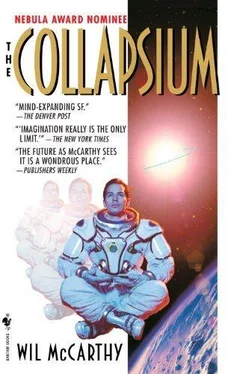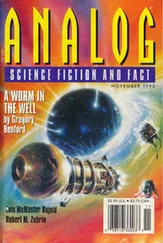Wil McCarthy - The Collapsium
Здесь есть возможность читать онлайн «Wil McCarthy - The Collapsium» весь текст электронной книги совершенно бесплатно (целиком полную версию без сокращений). В некоторых случаях можно слушать аудио, скачать через торрент в формате fb2 и присутствует краткое содержание. Город: New York, Год выпуска: 2000, ISBN: 2000, Издательство: Del Rey/Ballantine, Жанр: Фантастика и фэнтези, на английском языке. Описание произведения, (предисловие) а так же отзывы посетителей доступны на портале библиотеки ЛибКат.
- Название:The Collapsium
- Автор:
- Издательство:Del Rey/Ballantine
- Жанр:
- Год:2000
- Город:New York
- ISBN:0-345-40856-X
- Рейтинг книги:3 / 5. Голосов: 1
-
Избранное:Добавить в избранное
- Отзывы:
-
Ваша оценка:
- 60
- 1
- 2
- 3
- 4
- 5
The Collapsium: краткое содержание, описание и аннотация
Предлагаем к чтению аннотацию, описание, краткое содержание или предисловие (зависит от того, что написал сам автор книги «The Collapsium»). Если вы не нашли необходимую информацию о книге — напишите в комментариях, мы постараемся отыскать её.
The Collapsium — читать онлайн бесплатно полную книгу (весь текст) целиком
Ниже представлен текст книги, разбитый по страницам. Система сохранения места последней прочитанной страницы, позволяет с удобством читать онлайн бесплатно книгу «The Collapsium», без необходимости каждый раз заново искать на чём Вы остановились. Поставьте закладку, и сможете в любой момент перейти на страницу, на которой закончили чтение.
Интервал:
Закладка:
Bruno mused, then slowly nodded. “It is ironic, yes. But it’s hardly the only such irony. And I doubt it’s quite the conspiracy you suggest. People probably just want their money’s worth, and haven’t really reflected on how it affects you personally. Or perhaps they have , but they still feel—rightly, I think—that someone has to bear the responsibility. It’s not always for us to choose our fates.”
“Not for me, at any rate. I do like to imagine I’ve bought some freedom of choice for other people. But anyway, it’s not like I have anything else to compare my life to. I’m content enough, yes, through long practice and long experience. And like everyone else, I reserve the right to complain sometimes. You will attend me in this, Philander.”
“As you wish, Highness.” Bruno couldn’t quite hide his smirk. “You know, I wasn’t always so suave. You’re just about the only person who accepted me, in those days, exactly as I was.”
“Suave!” she laughed. “Well, that’s one word for it, I suppose, though not one that leaps most readily to mind. But seriously, Bruno, I don’t accept you. I never have; you’re not a very acceptable person. I love you, and that’s a very different thing.”
“Indeed,” he agreed. ‘Very different. I wouldn’t know what love was if not for you. It’s difficult to leave you here and go about my business; surely that’s understood.”
She looked sad then, which made him feel guilty. He almost decided right then to stay in the Queendom forever. Almost.
“Unfortunately,” she said, ”even twenty kilometers away, news cameras have an alarming ability to resolve fine details. If we were, say, to duck into one of these washrooms for even a moment, the headlines would last the rest of the year. So I’m afraid you must kiss me chastely on the lips, just once, and take your leave of me.”
“Yes, Highness,” he said, ever the obedient one, and complied exactly with her instructions.
“Oh, phooey,” she said, punching him lightly on the chest. “Is that the best you can do? Do my hints and temptations mean nothing?”
“That wasn’t very grown-up of you,” he said, feigning both pain and indignation.
“Who ever said I was grown up?” she returned, and pushed him bodily through the fax gate.
For once, he experienced a distinct sensation of travel; her laughter cut off instantly, and the cool touch of her hand seemed very distant indeed. Sweet sorrow? Pah, there was nothing sweet about it. On the other side was full daylight and a decidedly chilly breeze. The trees around him swayed, and the clouds scudded overhead like speeding aircraft, and the breeze became a wind that ruffled and flattened the meadow grass as he hurried toward his little white house.
Hurried, because he knew what happened next; even as the house opened a door for him, even as his staff of robots swarmed to pull him inside, the ground tilted beneath them all, then straightened, then tilted again the other way. The Onion! Blast it, he’d nearly forgotten. How was he going to dispose of that thing? Saving the Queendom was trouble enough, but this, this was difficult!
“Welcome, sir,” the house offered as gravity gradually returned to something approaching its normal magnitude and direction.
One of his robots fell over.
The others seemed not to notice it, except as an obstacle to be danced around or avoided altogether as they hurried to bring him food, drink, fresh clothes, or whatever it was they thought he needed right now. But to fall —such clumsiness was unheard-of, even in the face of the Onion’s disturbances. The one that had fallen had a scuffed, somewhat battered look to it, and presently it turned its blank metal face up toward Bruno in what could only be described as a pitiful manner, and emitted a sharp, questioning mewl.
Forgetting all else for the moment, Bruno cried out in surprise and delight and extended an eager hand toward the robot. “Hugo! Good God, man, you’ve learned to walk!”
BOOK THREE
Thrice Upon a Schemer’s Plotting
Chapter Fourteen
in which an ancient question is revisited
Though Isaac Newton is best known for his pomiary investigations into the nature of gravity, he was in fact quite troubled by his findings. Action at a distance, an effect with no explicable cause? The idea would be preposterous if its truth weren’t so readily demonstrated. And while gravity was bothersome, inertia was by far the deepest thorn in his aristocratic hide, a thing he itched and scrabbled at right up to the final hours of his life.
A ship, he reasoned, must part the waters ahead of it, must push the waters aside to make a place for itself to move forward into. This requires energy; hence the need for sails, or oar-wielding galley slaves, or some other means to push against the water’s resistance. So perhaps the air and Earth and even the space between planets were permeated with a kind of fluid? One which resisted the acceleration of the bodies within it, creating this phantom “inertia” that seemed to constrain the motions of every object in God’s strange universe?
But if that were true, why would those selfsame objects, having been accelerated into motion, then remain in motion indefinitely? Why was the amount of force needed to decelerate an apple the same as that used to accelerate it in the first place? No ship had ever sailed thus; no fluid had ever allowed it. What properties would such an intangible fluid possess? Newton realized the question was fundamental, but after decades of pondering and wondering and quietly beseeching the powers of Heaven he was still no closer to understanding, and so he died.
What he didn’t know, of course, was that the “fluid” was none other than light , the half-filled photon states of the zero-point vacuum churning in a perpetual storm of electric and magnetic potentials, which in turn resisted—and continue even now to resist—the acceleration of quarks and other charged particles. Since this field is isotropic, or uniform in all directions, and Lorentz-invariant, or uniform at all velocities, a force is required to alter the path or speed of any charged particle, on any trajectory at any time, anywhere in the universe. And since the interaction of charge with the zero-point field is precisely what gives rise to the illusion of “matter,” the force required to accelerate an object winds up being directly proportional to its mass.
For nearly three centuries after Newton, philosophers were content to regard this “inertia” as some inherent property of matter, axiomatic and therefore inexplicable, where in fact Newton’s strained speculations had been much nearer to the truth.
In the tenth decade of the Queendom of Sol, on a miniature planet orbiting at the middle depths of the Kuiper Belt, there lived a man named Bruno de Towaji who, at the time of our final attention, was brooding over an aspect of this very problem, and wishing to God he could be half as smart as Newton about it. He was in the habit of maneuvering very large masses with very great precision, and the energies involved—a direct consequence of Newton’s inertia—were straining the limits of his infrastructure.
He was a sort of chemist or materials scientist, but the particles he worked with weighed a billion tons each, and swallowed light, and bent and twisted the spacetime around them. They were known classically as “black holes,” industrially as “collapson nodes,” but in Bruno’s private lexicon they frequently adopted the names of anatomical features or bodily fluids or social functions best left unmentioned here.
It was daytime on Bruno’s little planet, but the planet’s little sun was dark, a shadow against the starscape, its nuclear fires encapsulated by a photoelectric conversion shell so that only its invisible heat escaped. Bruno lay on his back, on a chaise longue, in a meadow beneath a sprawling, hot, dew-dripping canopy of stars. The atmosphere was only a few meters thick because, yes, the planet really was that small, and so the stars didn’t twinkle at him, but rather glared down with a hard, steady light that gave little doubt as to their nature. Had cavemen seen such a light they’d have guessed immediately that the stars were little suns, or large ones seen from a very great distance. The constellations would have been perfectly familiar, too, save for the bright yellow star off the tail of Sagittarius. That was Sol, the Queendom, the whole of humanity huddled around that pinprick of warmth. An ordinary star, and at this distance not really any brighter than Sirius.
Читать дальшеИнтервал:
Закладка:
Похожие книги на «The Collapsium»
Представляем Вашему вниманию похожие книги на «The Collapsium» списком для выбора. Мы отобрали схожую по названию и смыслу литературу в надежде предоставить читателям больше вариантов отыскать новые, интересные, ещё непрочитанные произведения.
Обсуждение, отзывы о книге «The Collapsium» и просто собственные мнения читателей. Оставьте ваши комментарии, напишите, что Вы думаете о произведении, его смысле или главных героях. Укажите что конкретно понравилось, а что нет, и почему Вы так считаете.












